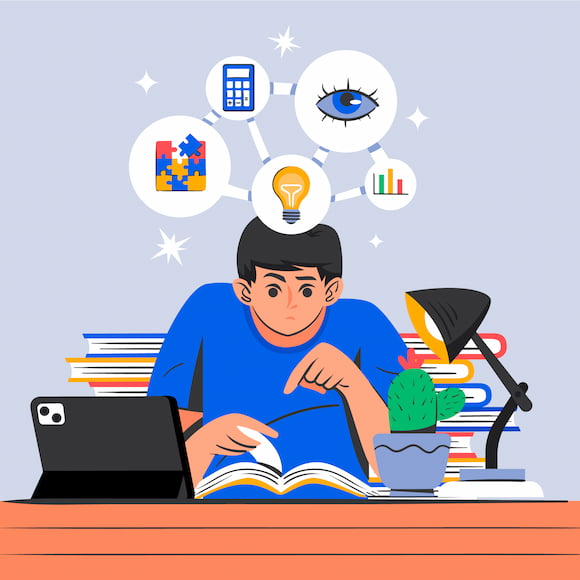Do you often find yourself struggling to study effectively? Whether you are a student preparing for exams or someone looking to enhance your skills, developing good study habits can make a significant difference in your learning outcomes. In this blog post, we will discuss six essential strategies that can help you study more efficiently and retain information better. From setting clear goals and creating a study schedule to using active learning techniques and taking regular breaks, incorporating these practices into your routine can lead to improved focus, understanding, and retention of material. By eliminating distractions and regularly reviewing and revising the material, you can take your studying to the next level and achieve your academic or personal growth goals. Let's dive in and discover how to study effectively!Achieve academic success by setting clear goals, creating a study schedule, and using active learning techniques. Stay focused by eliminating distractions and taking regular breaks.

Setting clear goals is essential to studying effectively. By clearly defining what you want to achieve, you can create a roadmap to success. Whether your goal is to improve your grades, learn a new skill, or prepare for an exam, having a clear objective in mind will help you stay focused and motivated.
One way to set clear goals is to make them specific, measurable, achievable, relevant, and time-bound. This method, known as the SMART criteria, ensures that your goals are attainable and provides a clear deadline for completion. For example, instead of setting a vague goal like improve my grades, you could set a SMART goal like raise my math grade from a B to an A by the end of the semester.
Additionally, it's important to regularly review and revise your goals to ensure that they are still relevant and aligned with your priorities. By regularly reassessing your goals, you can make adjustments as needed and stay on track towards achieving academic success.

One of the most important aspects of effective studying is creating a study schedule that works for you. This involves setting aside dedicated time each day to focus on your studies, ensuring that you have allocated enough time to cover all the necessary materials.
When creating a study schedule, it's crucial to consider your own personal preferences and learning style. Some people may prefer to study in shorter, more frequent sessions, while others may prefer longer study sessions with breaks in between. Experiment with different schedules to find what works best for you.
Additionally, make sure to set specific goals for each study session. This will help keep you motivated and on track, as you will have a clear idea of what you need to accomplish during each study session. By setting clear goals and creating a study schedule that aligns with your learning style, you can maximize your study efficiency and make the most of your study time.

One of the key aspects of studying effectively is being able to eliminate distractions. Distractions can come in many forms such as social media, noisy environments, or even internal thoughts. By identifying these distractions and finding ways to eliminate or minimize them, you can create a more focused and productive study environment.
One way to eliminate distractions is to create a designated study space that is free from any potential disruptions. This could be a quiet room in your home, a library, or a coffee shop where you can fully concentrate on your studies without any interruptions.
Another helpful tip is to turn off notifications on your electronic devices to avoid being tempted to check them constantly. By setting boundaries for yourself and establishing a routine, you can train your mind to focus solely on the task at hand without being pulled in different directions.

Active learning techniques are essential for improving retention and understanding of material. By engaging with the material actively, students can better absorb and apply the information they are learning.
One effective active learning technique is to participate in group discussions or study groups. By discussing the material with others, students can deepen their understanding through explaining and hearing different perspectives.
Another active learning technique is to engage in hands-on activities such as experiments or simulations. By experiencing the material firsthand, students can make connections and see real-world applications of what they are learning.
When it comes to studying effectively, one important aspect that is often overlooked is the importance of taking regular breaks. It may seem counterintuitive, but studies have shown that taking breaks during study sessions can actually improve focus and retention of information. Our brains are not designed to focus for long periods of time without a break, so incorporating short breaks into your study schedule can be beneficial.
During these breaks, it is important to give your brain a chance to rest and recharge. This could involve going for a short walk, doing some stretching exercises, or simply taking a few minutes to relax and clear your mind. By allowing your brain to rest, you are giving it the opportunity to process and retain the information you have just studied.
Additionally, taking regular breaks can help to prevent burnout and improve overall productivity. When we push ourselves to study for long periods without a break, we are more likely to experience fatigue and decreased motivation. By taking short breaks throughout your study session, you can maintain a higher level of focus and energy, which can ultimately lead to more efficient learning.
When it comes to studying effectively, reviewing and revising material is a crucial step in the learning process. By regularly going over the information you have learned, you are reinforcing your memory and increasing your retention of the material. It also allows you to identify any areas where you may be struggling and need to focus more attention on.
One effective way to review and revise material is to create flashcards or summaries of key points. This can help you condense the information into bite-sized chunks that are easier to digest and remember. You can quiz yourself using the flashcards or go over the summaries to ensure that you have a solid understanding of the material.
Another useful technique for reviewing and revising material is to teach the information to someone else. By explaining the concepts to another person, you are reinforcing your own understanding and identifying any gaps in your knowledge. This can be a powerful way to solidify your learning and ensure that you have a comprehensive grasp of the material.